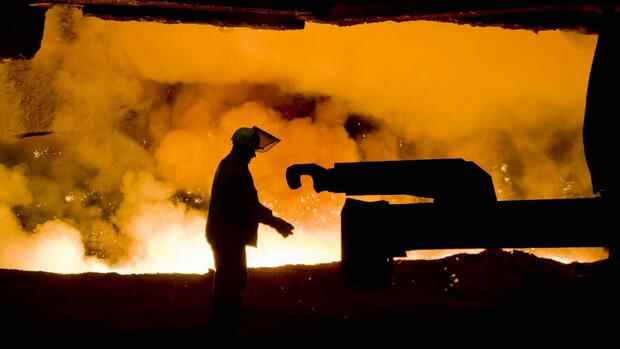Production problems are particularly severe in the energy-intensive economy.
(Photo: imago images/simme)
Berlin Due to the sharp increase in energy prices, more and more companies are giving up their production or have already restricted their operations. This shows a survey of 3,500 companies by the German Chamber of Commerce and Industry (DIHK), which is available to the Handelsblatt.
16 percent of industrial companies want to reduce their production. According to their own statements, almost a quarter of them have already done so, and another quarter are in the process of doing so.
About half of the companies state that they are still planning corresponding steps. “These are alarming numbers,” says DIHK President Peter Adrian. “Many companies have no choice but to close down or relocate production to other locations.”
However, economists also see this as a sensible development when it comes to saving energy, especially gas. “As long as everyone pays the same gas price, that means that the production that can most economically be avoided will be reduced,” explains the Bonn economist Christian Bayer.
Top jobs of the day
Find the best jobs now and
be notified by email.
With lower consumption, the storage tanks can be filled more quickly and the probability of a gas shortage in Germany in winter decreases. In view of Russia’s threats to turn off the gas tap again, this danger has not yet been averted.
A third want to do without the production of steel, glass and the like
According to the DIHK evaluation, the energy-intensive economy is particularly badly affected. These include the steel, glass and paper industries. 32 percent of this sector want to reduce or stop production. Eight percent have already done so.
For DIHK President Adrian, the matter is clear. “What we are currently observing in terms of the decline in gas consumption in industry is mainly due to the shutdown of machines and plants,” he says. There is definitely potential to save energy by using it more efficiently. But there are often legal regulations in the way. “Politicians let far too much time pass by with all this.”
According to his own statements, Adrian has therefore suggested creating a legal exception paragraph that temporarily overrides certain formalities. As examples, he cited the need for new permits when companies convert their plants from gas to oil, or restrictions on the installation of photovoltaics.
Debate about cooler workplaces
The general manager of the Confederation of German Employers’ Associations (BDA), Steffen Kampeter, sees another point: “This particularly applies to questions about room temperatures – in winter, but also with cooling in summer.”
The applicable labor law provides guideline values for temperatures at the workplace. Accordingly, the lower minimum values for the air temperature should be between twelve and 20 degrees Celsius, depending on the severity of the activity.
The applicable labor law provides guideline values for temperatures at the workplace.
(Photo: IMAGO/Kirchner Media)
Twelve degrees apply to hard physical work, and 17 to 20 degrees apply to less physically demanding work. “A lot of energy can be saved here – which of course does not mean that our employees will soon be working in the cold,” said Kampeter of the dpa. Federal Economics Minister Robert Habeck (Greens) presented new energy-saving measures on Thursday.
In winter, office buildings and public facilities should no longer be heated everywhere. This applies to the rooms in which one does not stay regularly. The ministry names corridors, large halls, foyers or technical rooms.
It will stay that way for six months. So far, Habeck has rejected a general reduction in temperature requirements for employers. Instead, companies that consume more than ten gigawatt hours a year should be obliged to make certain investments in energy efficiency. The Economics Minister wants to decree that planned measures that pay off economically within two years must now also be implemented.
>>Read here: Habeck wants to prevent the gas crisis with a package of measures
The announced auction model for gas is also scheduled to start in October. According to a report in the “Frankfurter Allgemeine Zeitung”, the first offers should be able to be submitted from September 15th. The model is intended to provide industrial consumers with incentives to save gas.
Gas auctions are scheduled to start in the fall
If a company does not use a certain amount of gas that it has bought, it gets paid for it. This gas can then be stored. The auction model is a “big step,” says economist Benjamin Moll from the London School of Economics. But this should have come before autumn.
>>Read here: Federal government rescue package for Uniper stands
According to information from the Handelsblatt, the Federal Network Agency is also planning to create an auction model in the event of a gas shortage. The gas that is in short supply would then be auctioned off to see which companies need it most.
That would be an alternative procedure to the previously planned state allocation of gas in the event of a shortage. It is still unclear whether and when this auction model will be used.
More: Should Europe show more courage towards Russia on the gas issue?

